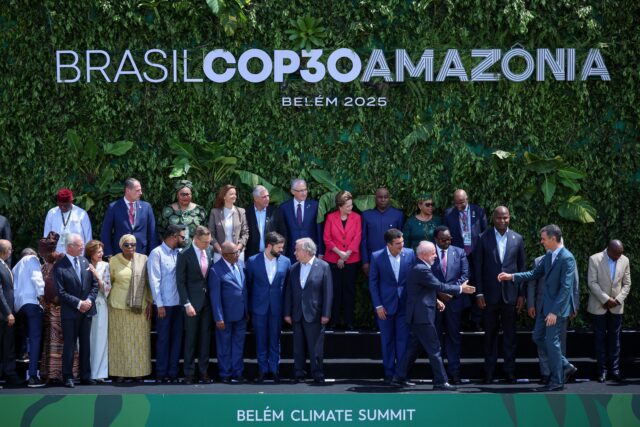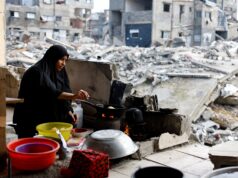
SÃO PAULO — The 30th United Nations Climate Change Conference, known as COP30, takes place in Belém, Brazil, Nov. 10-21 and will gather a significant number of church officials and activists — a sign that the climate crisis has become a central concern for Catholics.
According to the Brazilian bishops’ conference, known for its Portuguese acronym CNBB, the church delegation is composed of eight cardinals, 47 bishops and 97 officials representing a number of Catholic ecclesial organizations.
“But in the so-called green zone of the COP30, numerous priests, sisters and lay Catholics will also take part in activities concerning the climate crisis debates,” Father Jean Poul Hansen, a CNBB adviser, told OSV News.
A number of Catholics will participate in parallel events as well. The largest of them is the People’s Summit, which will happen at the Federal University of Pará Nov. 12-16. Attendants — civil society activists, scholars, Indigenous groups and other traditional populations — will debate climate action from the perspective of solidarity and social justice.
Catholics, including clergy members, will also attend the Ecumenical and Interreligious Tapiri – Towards COP30 Nov. 11-16. Tapiri, an Indigenous Tupi word, means a hut for walkers. The idea is to gather Christians, members of other faiths, and traditional populations and discuss the impact of the climate crisis on those groups’ lives.
At the official event, international delegates will debate controversial topics, like climate action funding. Developing nations argue that rich countries should finance part of the measures that must be taken to deal with climate change.
At first, countries agreed that by 2035 that amount should be as high as $300 billion per year. But the “Baku to Belém Roadmap,” released by the Brazilian presidency of the COP30, showed how existing mechanisms could increase those funds to $1.3 trillion per year.

The parties will also debate the Nationally Determined Contributions, known as NDCs, which are the measures that each nation must adopt in order to really avoid the increase of 1.5 degrees Celsius, or 2.7 Fahrenheit, in world climate by the end of the century. The COP30 will be the moment for them to present new or revised NDCs.
The church will take part in different sessions in COP30’s blue zone, talking about the Global South’s current conditions and needs, climate justice, and just energy transition.
Most of such discussions will have the presence of Cardinal Jaime Spengler — CNBB’s president, who also heads the Latin American and Caribbean Episcopal Council, known as CELAM — along with Cardinal Fridolin Ambongo Besungu of Kinshasa, Congo, who heads the Symposium of Episcopal Conferences of Africa and Madagascar, or SECAM; and Cardinal Filipe Neri Ferrão, president of India’s bishops’ conference, who heads the Federation of Asian Bishops’ Conferences.
The three cardinals signed a letter from the bishops of the Global South, issued in September, and handed in to the bishops’ conferences of Europe, the United States and Canada, as well as Pope Leo XIV and the U.N. The document asked the church and U.N.’s partner states to act like a bloc when it comes to climate change, denouncing its impacts on the poorest populations of the planet.

“Brazil’s church was organized in order to influence the COP as much as possible. We decided to write that letter in order to express the central elements that should be debated at the event in our opinion,” Father Dario Bossi, a member of CNBB’s Integral Ecology and Mining Commission and of the Brazilian bishops’ commission for COP30, told OSV News.
The text, which expressed the church’s stance on the climate crisis and on the false solutions presented by some social segments, ended up being assimilated by CELAM, which made a few changes to it. The letter was then revised by the teams of Cardinals Ambongo and Neri Ferrão, who also added their views — including their concerns over the adaptation of climate finance to the needs of the most impacted populations, like the residents of islands that can be submerged.
That has been one of the major organizational efforts from the church for COP30, among several other activities that have been launched over the past two years.
“Cardinal Spengler created a commission for COP30 that has been producing content about climate change and guides for the discussion of that theme in parishes and dioceses,” Father Hansen, CNBB adviser, said for his part.
All that effort resulted in the organization of the so-called pre-COPs — capacity-building meetings with pastoral agents and activists from each Brazilian region: South, Southeast, Center-West, Northeast and North.
The preparation for those meetings began with discussions in parishes and then in dioceses. That process encompassed almost every diocese in Brazil. The pre-COPs occurred from March to August this year.
“Such works won’t stop, despite COP30’s results. The church will keep working after the meeting. Like Pope Francis said, change comes from those little things we do on a daily basis,” Father Hansen concluded.








